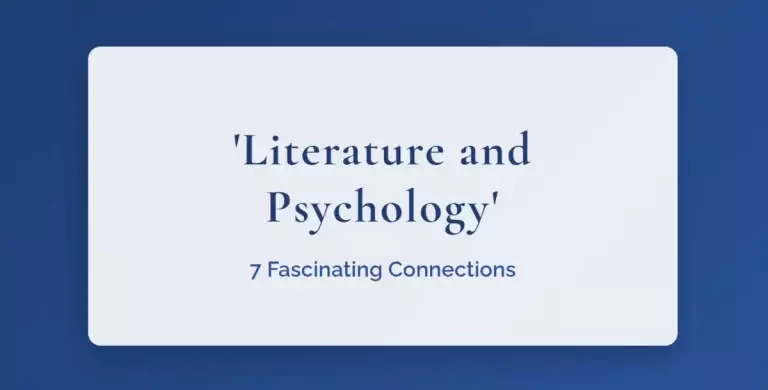The realms of literature and psychology have long been intertwined, each informing and enriching the other. From character development to reader response, the intersection of these two fields offers profound insights into the human mind and experience. In this post, we’ll uncover seven fascinating connections between literature and psychology that highlight the depth of this relationship.
Table of Contents
1. Character Psychology
Authors often serve as amateur psychologists, creating complex characters with rich inner lives.
The connection: Literary characters can exemplify psychological theories and disorders, providing vivid case studies for readers to understand human behavior.
Example: The character of Holden Caulfield in J.D. Salinger’s “The Catcher in the Rye” is often analyzed for his depressive symptoms and possible post-traumatic stress disorder.
2. Narrative Therapy
The act of storytelling itself has therapeutic value, both in literature and psychology.
The connection: Narrative therapy in psychology uses principles similar to those in literature, helping individuals reframe their personal narratives to overcome challenges.
Example: Virginia Woolf’s stream-of-consciousness technique in novels like “Mrs. Dalloway” mirrors the flow of thoughts in a therapy session.
3. Reader Response Theory
This literary theory examines how readers interact with texts, closely aligning with psychological concepts.
The connection: Reader response theory explores how individual experiences and psychological makeup influence interpretation of literature, bridging literary analysis and cognitive psychology.
Example: Stanley Fish’s concept of “interpretive communities” shows how shared psychological and cultural backgrounds shape literary interpretation.
4. Psychoanalytic Literary Criticism
Freudian and post-Freudian theories have significantly influenced literary analysis.
The connection: Psychoanalytic approaches to literature uncover subconscious motivations of characters and authors, providing deeper understanding of texts.
Example: Hamlet’s behavior is often analyzed through an Oedipal lens, considering his relationship with his mother and uncle.
5. Cognitive Poetics
This field combines cognitive psychology with literary analysis to understand how we process and respond to literary texts.
The connection: Cognitive poetics examines how literary devices affect readers’ mental processes, bridging neuroscience, psychology, and literary studies.
Example: The use of metaphor in poetry can be studied for its cognitive effects, as in the works of cognitive linguist George Lakoff.
6. Bibliotherapy
The therapeutic use of books in treating psychological disorders is a growing field.
The connection: Bibliotherapy utilizes the power of literature to provide psychological insights and emotional catharsis for readers.
Example: Reading groups for depression often use works like Matt Haig’s “Reasons to Stay Alive” to foster discussion and healing.
7. Archetypal Criticism
Based on Carl Jung’s theory of archetypes, this approach analyzes universal symbols and characters in literature.
The connection: Archetypal criticism connects literature to the collective unconscious, revealing shared psychological patterns across cultures and time.
Example: The ‘hero’s journey’ archetype, found in works from “Beowulf” to “Star Wars,” reflects universal psychological experiences of growth and transformation.
Read this too: ‘Dry’ by Neal Shusterman and Jarrod Shusterman: Comprehensive Summary and Analysis
The Impact of These Connections
The interplay between literature and psychology has far-reaching implications:
- Enhanced Understanding: Psychological insights deepen our appreciation of literature, while literature provides vivid illustrations of psychological concepts.
- Therapeutic Applications: The use of literature in psychological healing opens new avenues for therapy and personal growth.
- Cross-disciplinary Research: The intersection of these fields spawns innovative research methodologies and theories.
- Cultural Insights: Studying literature through a psychological lens can reveal broader cultural and societal patterns.
- Improved Writing: Writers who understand psychological principles can create more compelling, realistic characters and narratives.
Challenges and Controversies
While the connection between literature and psychology is rich with potential, it’s not without its challenges:
- Overinterpretation: There’s a risk of reading too much psychological meaning into texts where it may not exist.
- Cultural Bias: Psychological theories applied to literature may not always translate across different cultural contexts.
- Reductionism: Focusing too heavily on psychological aspects may oversimplify complex literary works.
- Ethical Concerns: Analyzing authors’ works for psychological insight into their personal lives raises ethical questions.
Practical Applications
Understanding the connections between literature and psychology can be valuable in various fields:
- Education: Teachers can use psychological insights to make literature more engaging and relatable for students.
- Mental Health: Therapists can incorporate literary works into their practice to help clients process emotions and experiences.
- Writing: Authors can leverage psychological principles to create more authentic characters and compelling narratives.
- Literary Criticism: Critics can employ psychological theories to offer new perspectives on classic and contemporary works.
Conclusion
The intersection of literature and psychology offers a rich landscape for exploration, revealing the depths of human experience and the power of storytelling. From the intricate psychology of fictional characters to the cognitive processes involved in reading, these seven connections highlight the profound relationship between these two fields.
As we’ve seen, literature serves not only as a mirror reflecting psychological truths but also as a tool for understanding and healing the human psyche. The archetypal patterns found in stories across cultures speak to our shared psychological heritage, while the individual responses to texts reveal the unique workings of each reader’s mind.
For students, educators, mental health professionals, and literature enthusiasts alike, recognizing these connections can open new avenues for learning, growth, and appreciation. It invites us to read more deeply, to write more thoughtfully, and to understand ourselves and others more fully.
As you encounter your next piece of literature, consider the psychological dimensions at play. How does the author create believable characters? What unconscious themes might be at work? How does your own psychological makeup influence your interpretation? By asking these questions, you’ll not only enrich your reading experience but also gain valuable insights into the complexities of the human mind.
The dialogue between literature and psychology is ongoing and evolving. As our understanding of the human mind grows, so too will our appreciation for the psychological depths of great literature. What new connections will future research uncover? The possibilities are as boundless as the human imagination itself.



1 Comment
Pingback: Why Tessa Hadley’s ‘Bad Dreams’ Is the Literary Mystery You Didn’t Know You Needed